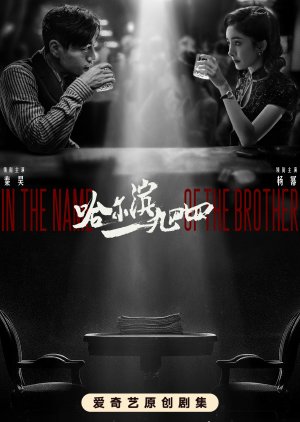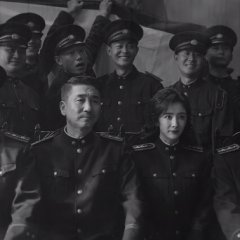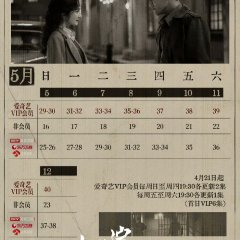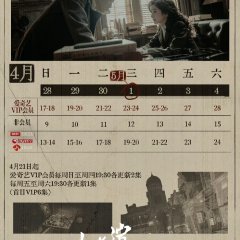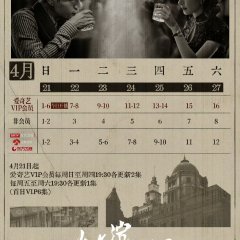Set in Harbin under the puppet Manchukuo regime in 1944, Song Zhuo Wen, an underground party member disguised as a railway police officer, is mistakenly identified by the head of the spy department, Guan Xue, as her lifesaver—but is actually Zhuo Wen's long-lost twin brother, Song Zhuo Wu. To uncover the ultimate mission of Kwantung Army officer Asano Daigo in Harbin, Zhuo Wen decides to use Guan Xue to infiltrate the spy department, but the sudden appearance of Zhuo Wu plunges him into unexpected trouble. Guan Xue is cold-blooded and suspicious, cruel and ruthless, while Zhuo Wu is impulsive by nature, often unintentionally sabotaging Zhuo Wen's operations. Only through the arrangements of their superiors do the brothers cooperate and protect each other, avoiding the overt and covert struggles among their colleagues in the spy department and eventually gaining the trust of Guan Xue and the Japanese officials. Within this short year, the underground party members endure hardships to uncover and stop a secret operation conspired by the Japanese army and the Soviet Union, root out the puppet Manchukuo spies within their party, and welcome the final victory of the war. (Source: iQIYI; edited by MyDramaList) Edit Translation
- English
- magyar / magyar nyelv
- עברית / עִבְרִית
- dansk
- Native Title: 哈尔滨一九四四
- Also Known As: Harbin 1944 , Ha Er Bin 1944 , Mei You Wo De Cheng , 没有我的城 , 哈尔滨1944 , 哈爾濱一九四四
- Director: Zhang Li
- Screenwriter: Wang Xiao Qiang
- Genres: Thriller, Historical, Mystery, Political
Where to Watch In the Name of the Brother
Cast & Credits
- Qin HaoSong Zhuo Wen | Song Zhuo WuMain Role
- Yang MiGuan XueMain Role
- Zhang Zi XianPan Yue [Secret Service Intelligence Unit chief]Support Role
- Luan Yuan HuiHu Bin [Secret Service Operations Unit chief]Support Role
- Rain WangXie YueSupport Role
- Liu Yu XuanGuan KaiSupport Role
Reviews
Superb show based on historical events
The cast was well selected with mature and superb acting from the lead and support actors giving depth to the show. The story takes place during the Japanese occupation of China in World War 2, specifically in the city of Harbin in the then puppet state of Manchukuo. The drama borrows from actual events that took place in Manchukuo including the operation of the infamous Unit 731 where the Japanese conducted research on chemical and biological weapons using humans for their experiments. Fascinating drama especially for those interested in the history of China through the Republucan era and into World War 2.Younu Senki
In the Name of the Brother is a butterfly struggling to break free from the grounded life of a caterpillar. It failed. But, oh, what coulda been!It’s 1944, and Nippon’s teikoku is on its last legs. Ah la Gramsci, the Japanese Order was dying and a new world struggling to be born. We meet Gan Xue and the Song brothers as the remnants of the Japanese Kwantung army, Manchuko patriots, Guomindang agents and Communists struggle for power in an age of monsters. One-third of the story is an undifferentiated mess of assassinations, kidnappings and torture.
The third of the story about the Song brothers — Communist Agents Extraordinary — was the weakest and most frustrating part due to excessive plot armour except when the writers decided to scapegoat Gan Xue as the show’s villain. A particularly egregious intervention by the ghost in the machine in Episode 25 was so terrible that I spent minutes after the credits hysterically laughing. That said, Qin Hao elevated the role, as expected, and the tech they used to achieve the twinning effect was. . . impressive. I still do not understand what other purpose making the secondary protagonists twins had besides trying to make Gan Xue the villain! But that’s why I don’t make the big bucks.
Luckily Gan Xue saves the day. Best girl is stylish, not the smartest but competent. Most importantly for the world she inhabits, she is tenacious and ruthless. The subplot of what is an otherwise straightforward tragic arc is that her life was shaped by the many betrayals by all the men in her life. She yearned for family but lost it all in the end, fated to end her days in gaol.
It’s annoying that the writers gave what were very likeable characters an ending more bitter than all that gall Goujian ate to remember to delete Wu from history. They really tried to portray fleeing to Japan with a pretty girl and a bag of gold as the wrong idea! Then dared to end with literal flag-waving scenes. Nah, bro. Some people deserve the Jin Yi Wei.
So, I’m torn. How does one rate a bad story with great characters?
Oh well. At least the soundtrack was superb, and the casting was superb except for one notable exception. Alas, this was one of those directors in love with auteur shooting styles. The man was going for metaphors and unreliable narrator techniques. Too much, chief. Too much!

